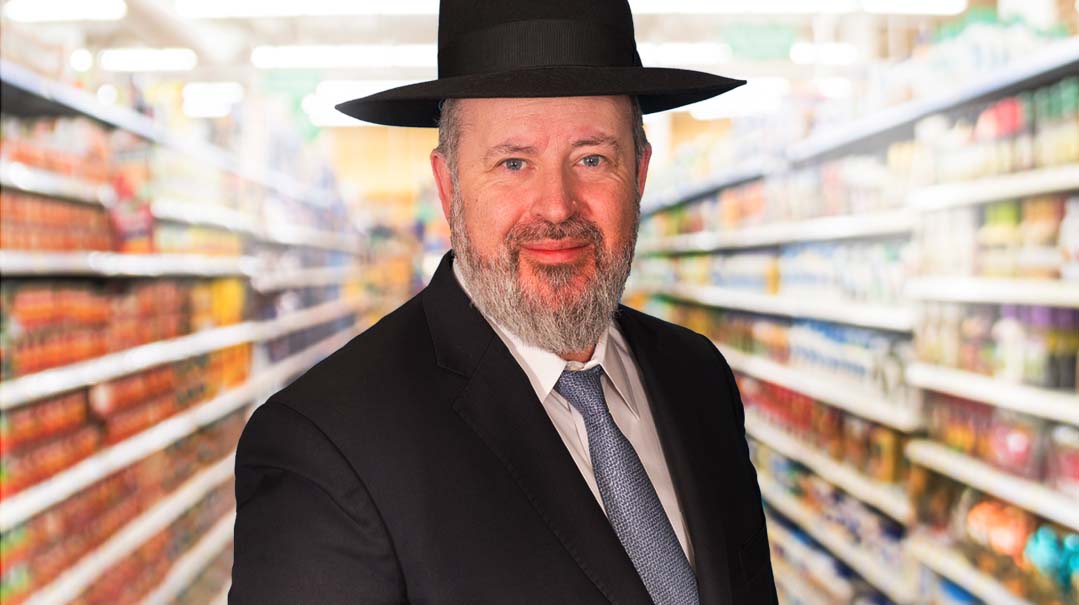Step Up to the Plate
| February 1, 2022Kashrus expert Rabbi Sholem Fishbane calls on kosher consumers to put their money where their mouth is

Photos: Tali Weldler
The explosion of kosher options today, coupled with an ever-demanding and competitive foodie culture, means that kosher consumers have more choices and food opportunities than ever before (think kosher cheeseburgers and facon-and-eggs). But it also means that kashrus certification agencies are faced with challenges more complex than ever before. With all that there is to celebrate in the kashrus world today, those responsible for ensuring that what lands in our mouths is truly up to standard are expressing concerns over the challenges the new food culture has created. Where does that put the kosher consumer?
“We’ve come a long way in the food market, yet in a sense, our success has become our enemy,” says Rabbi Sholem Fishbane, kashrus administrator at the Chicago Rabbinical Council (cRc) and executive director of the Association of Kashrus Organizations (AKO), an umbrella group of major kosher certifying agencies. “Today’s generation of consumers is so accustomed to having everything out there in a kosher version that we’ve slowly let down our guard.”
Rabbi Fishbane, who has been one of the driving forces behind the improvements and advances in the North American kashrus scene, is credited with blending halachic proficiency and organizational expertise to increase communication between certifying agencies, along with introducing innovations that have become the gold standard in the industry. Still, his ambivalence is a sentiment being echoed by others in the certification loop whose jobs range from checking and verifying food shipments to inspecting (and often sleuthing) ingredients to establishing proper protocol for washing hard-to-clean vegetables. The agencies perform admirably, they say, but there is a key role that the consumer plays as well: a role that includes being personally educated in matters of kashrus, being on the lookout for areas of concern, and most importantly, standing up and taking responsibility for standards and insisting they be followed.
Of course, what a century ago was unimaginable in the often scandalous realm of kashrus has been not only achieved, but exceeded. Heightened awareness, technological advancements, and a dedicated industry of poskim, rabbanim, mashgichim, and intra-agency cooperation and collaboration have led to an unprecedented level of kashrus standards internationally. But all that didn’t stop Rabbi Fishbane from giving Mishpacha a front-seat ride around Lakewood, New Jersey, where he pointed out certain issues within various venues that have been concerning mashgichim — and what consumers can do about them.
As anyone who’s worked with Rabbi Fishbane can attest, he brings a powerful energy to any job he undertakes. As soon as we meet, that energy is evident. It’s a chilly 40 degrees in this bustling parking lot, yet the native Chicagoan steps out of his car coatless, and he waves me into a nearby supermarket without wasting time.
“Take in the scene,” he says, as we head down the aisles, “and notice how it’s a heimishe environment, and therefore in our heads we start creating a conception that everything sold here is one thousand percent okay to eat.”
He’s right. There’s that kosher feel that permeates the store: Avraham Fried is entertaining customers over the loudspeaker, a Tu B’Shevat stand displays a potpourri of delectable dried fruit, and the clientele is the predictable mix of frum busy mothers, balabatim on errands for their wives, and hat-and-jacketed yeshivah bochurim stocking up on salsa and chips for their Leil Shabbos oneg.
The pervading atmosphere is relaxed and pleasant — great effort and creativity has obviously been enlisted to give a great shopping experience — yet Rabbi Fishbane walks with purpose, his eagle eyes taking in the nuances that come with being immersed in the world of kashrus.
Our first stop is at the produce section. There, fresh bags of romaine lettuce are stocked neatly, tilted ever so slightly as if asking to be pulled off the shelf and into the shopping cart. The bags are proudly labeled as “triple washed,” yet Rabbi Fishbane grimaces. There is no sign in sight, and he’s concerned for the innocent shopper who assumes that “triple washed romaine” must mean that it’s bug free and fine to eat.
“Unless there is a highly reliable hechsher attesting explicitly to the fact that the lettuce is bug-free, the fact that the packaging says it was triple-washed cannot be relied on,” he says. At the cRc certified restaurants, his policy is that the mashgichim have to inspect even the triple-washed romaine and more often than not, he avers, that thrice-checked lettuce is still infested.
Yet the mere fact that it’s in a “kosher” store, and with no clear signage notifying customers of the difference between lettuce with a good hechsher and those without, creates a situation ripe for mistake. “People assume the store itself is a hechsher,” Rabbi Fishbane says. “In fact, a good friend of mine who recently moved from Boro Park to an out-of-town community was thrilled to find the same brand of triple-washed lettuce in Shop-Rite that he was used to from his supermarket back in Brooklyn, assuming that if it was sold in a heimish store, it must be okay to eat right from the package. It must be stressed that a heimish store does not equal a hashgachah.”
Rabbi Fishbane leads me to the frozen food section, where bags of frozen vegetables are piled high. Again, the innocuous juxtaposition of reputable brands with those less so is jarring.
“No one is deliberately misleading anyone,” he says, “but does every consumer understand that Bodek and Birds Eye stand a world apart not only in price, but from a kashrus standpoint?” Due to the method in which they’re grown, cut, and checked, the Bodek vegetables, says Rabbi Fishbane, are fine to eat. Birds Eye, on the other hand, for some vegetables as least, can still be forbidden.
We move on, passing a tantalizing pickle-and-olive bar, a seed display reminiscent of Jerusalem’s Machaneh Yehudah shuk, and a sweets counter piled high with sugary treats. Rabbi Fishbane is not an alarmist by nature, and he’s the first to admit that in all probability, everything we’re seeing — the candies, the olives, the roasted, salted, and unsalted famed Israeli jumbo sunflower, pumpkin, and watermelon seeds were sourced properly, under appropriate supervision, and with the necessary terumos and maasros taken off before export. Yet the certifications attesting to their kashrus are not necessarily ones that are up to community standards.
Additionally, packages and containers can get conflated somewhere in the chaos of the packing, distribution and shipping. As rav hamachshir of numerous Chicago supermarkets, he’s seen this happen all too often — boxes of nonkosher candies will get mixed up with kosher ones, and other mistakes can happen on the open stands. (In Chicago’s supermarkets, cRc’s policy is that there be a mashgiach in the store as a whole so that such mistakes don’t happen.)
Rabbi Yakov Teichman, the rabbinical coordinator responsible for the operations of the Food Service Department at OK Kosher Certification, relates how OK head Rabbi Don Yoel Levy a”h decided to pull fresh liver off the shelves of a particular kosher supermarket. Liver has to be broiled within three days of shechitah in order to be considered kosher, and when this store began selling the fresh livers, Rabbi Levy, the rav hamachshir, decided to take a survey of the women in his office to see if they knew the proper procedure for kashering the livers.
When only one woman knew the appropriate method, the agency first tried putting instructions on the packages and posting signs next to the product. When even that didn’t work out, they insisted that the store stop selling it. Rabbi Teichman saw the results immediately.
“The next week,” he relates, “a woman came into the store while we were present and asked why livers were no longer available. We asked her how she had previously prepared the livers, and from her answer, it was clear that she had been doing so in a manner that did not properly clean out the blood, and in all probability left the livers treif,” he said.
Can something be done? Rabbi Fishbane’s answer is resolute. “Yes. Start asking stores if there is a hashgachah, if there’s someone who’s taking achrayus on the store — not just on the individual products, but someone who is overseeing the store as a whole, so that products don’t get mismatched, so that the hechsherim the store uses for certain products are acceptable to whatever clientele the store is serving, so that customers are not unwittingly buying products they assume are fine to eat as is,” he says. “In every area of kashrus where we’re faced with concerns, the hamon am — the community as a whole taking responsibility — has a tremendous capacity to rectify the situation. In this area, customers can insist that supermarkets have a mashgiach over the store.”
The next stop on our itinerary is a local fundraiser, one of the glitziest affairs in a city swamped with parlor meetings, fundraisers, and dinners supporting its own mosdos and those from around the world.
We arrive as preparations are in full swing: Rented furniture is being carted in, florists are arranging the décor, and with a few wires and LED bars, a lighting technician has magically bathed the room in a warm, blue glow.
The caterer is relegated to the garage, where he is preparing pulled lamb gnocchi with mushroom gumbo truffle oil, bruschetta de carne sourdough crostini, and sous vide surprise roulade with Argentinian chimichurri, not to be outdone by chicken soup in a sourdough crostini basket with crispy facon and truffle mayo, to be followed by an entrée of French roast and standing rice capon with creamy Yukon mash and gourmet vegetable stacks, all followed by a dessert that we won’t even attempt to spell.
(For full disclosure, the hosts were more than gracious to allow us — camera crew and all — to invade the arduous preparation. Their polite invitation did not extend to the event itself though, so we had to suffice with lifting the above descriptions from the menu provided by the party planner. As the donors started to arrive, drinks started to flow, and the alluring aroma of grilled meat started to fill the spacious home, we were politely reminded that our invitation had expired, and that we were more than welcome to continue our conversation elsewhere.)
We took our place in the kitchen, where the party planner himself joined us, and due to the sensitivities surrounding the industry, insisted on anonymity.
“This particular event is under hashgachah,” said Rabbi Fishbane, “but the problem is that it’s the exception to the rule. In most events that we see today, even in the most upstanding communities, the caterer is under hashgachah, but the actual party isn’t. Why is that a problem? Because the caterer is only providing the main food on the menu. But who’s bringing in the sushi chef? Who’s overseeing the bar? Who’s ordering the specialty cookies and desserts? Who’s ensuring the rented keilim and props are kosher and they are being used exclusively for either fleishig or milchig events? That all falls on the party planner. And a party planner’s job is to please his client, to get whatever it takes to placate his clients’ fancy. If he says ‘no, I can’t do that,’ he risks losing his entire business.”
At today’s events, one plate can comprise the work of 16 different vendors, some from establishments with a hashgachah and others from home businesses. “Without a reputable mashgiach — backed by an acceptable kashrus agency — the entire event is prone to pitfalls, and can lead to real treif being served,” Rabbi Fishbane notes. “On the other hand, if there is a mashgiach, party planners who realize that something is wrong can blame it on the fact that the mashigach doesn’t let, so their business is protected.”
At a speech at this year’s Agudah convention, Rabbi Fishbane related the now-infamous story of a recent Motzaei Shabbos affair that featured a full sushi bar. A rav who was well-versed in the halachos and dynamics of kashrus noticed that the sushi was a bit too fresh to have been made before Shabbos, and not enough time had elapsed since the end of the zeman on Motzaei Shabbos to cook up such a large quantity of rice.
The rav found the party planner, and asked under whose hashgachah the sushi was. The party planner shrugged — he had hired the Japanese sushi chef through a “shadchan” who made a business out of matching up kosher restaurant sushi chefs with party planners, but insisted hashgachah wasn’t his problem. After confronting the sushi chef himself, it was discovered that indeed, the rice was cooked, by a non-Jew, on Shabbos (possibly a violation of bishul akum and amirah l’akum in one fell swoop). And, the rav discovered, the fish itself was treif. “Unfortunately,” said Rabbi Fishbane, “the episode didn’t shock anyone in the kashrus world.”
“It’s a complete hefker velt out there with the party planners,” says Rabbi Tzvi Fischer, rosh havaad of Oregon Kosher. He was recently in Monsey for a wedding, when a scrumptious dessert table was rolled out featuring a mouthwatering display of yodels, brownies, mini cakes, and cupcakes. Rabbi Fischer, who is intimately familiar with kashrus matters, knew to ask the hall’s mashgiach if the dessert table was under his hashgachah. When the fellow replied in the negative, Rabbi Fischer asked how he could certify the hall and not the dessert table, only to be told that “alleh veissen — everyone knows” — that the dessert tables aren’t under his purview, but are the responsibility of the party planner.
Rabbi Fischer approached the party planner, who admitted that she didn’t have a hashgachah herself, but that she only bought her products from “heimish people.” Rabbi Fischer then asked if he could see the packages, but the party planner refused — she didn’t want to give away her vendors, claiming these were trade secrets. Rabbi Fischer persisted. He’s from Portland, almost 3,000 miles from Monsey, he explained, and she didn’t have to be concerned about his competition.
He finally got access to the boxes, which had the information of each home business on it. Rabbi Fischer made a few calls to discern what products each vendor had used, and after some sleuth work discovered that one of the cakes on the table used carmine — a nonkosher, insect-sourced topping favored by food artists for its brilliant red color.
Rabbi Teichman of the OK says that the most well-intentioned people are often not knowledgeable about ingredients. He remembers certifying a caterer at a large event for Orthodox women, with a group of frum ladies running the event. “As one component of our certification, we also check any goody bags that will be handed out. In the kitchen, one of the ladies had bags of candy from China without a hechsher. Those candies typically contain glycerin, a highly sensitive product from a kashrus standpoint that is in all likeliness treif. When we pointed it out to her, her initial reaction was, what could be wrong with candy? She told us she bought it in bulk online. She was horrified when we explained to her that it wasn’t kosher.”
At another event, Rabbi Teichman’s team caught milchig ice cream about to be served after a fleishig meal.
The party planner we’re visiting tonight is obviously pained by the stories, yet in defense of his industry, he insists that the onus to hire a mashgiach cannot become the responsibility of the caterer or party planner. For starters, there is the expense involved. “Follow the money trail,” he says. “The caterer usually takes a flat fee, which means that if he has to start hiring a mashgiach for the event, that expense is coming out of his own pocket, so why would he hire anybody decent?”
For the party planner to hire a mashgiach directly is also not ideal because of the conflict of interests. How trustworthy is the mashgiach if he’s essentially an at-will employee of the party planner, who wants nothing more than a smooth event and to satisfy his client (as well as impress future potential clients)?
“For example, take what is probably the most common mistake we see with events on Shabbos,” says Rabbi Fishbane. “They run out of ice, and the party planner tells a goy to fetch them some from a local store. Often, the mashgiach who walks in and tries to tell the goy to stop will be told to go fly a kite.”
When it comes to events where there are a number of involved parties, the only true workable model, says Rabbi Fishbane, is for the host to hire an independent mashgiach associated with a proper hashgachah to oversee the event. “This way,” he says, “the mashgiach will actually have authority and the full backing of the host to step in where necessary.” Another option would be for the host’s rav to send an independent mashgiach.
The community, he stresses, should only patronize events that have a hashgachah listed. “We wouldn’t eat in a restaurant without a hashgachah that we recognize and trust,” he explains, “and we have to understand that unless — along with every invitation that’s sent out for parlor meetings or events of that nature — there is a reputable hashgachah listed on the bottom, it’s tantamount to doing just that.”
Rabbi Fishbane points out that the need for independent certification extends well beyond high-end events. Even a standard kiddush in shul today can feature products from different vendors and fare from home businesses, which have seen a drastic upsurge since the beginning of the pandemic.
The increase and popularity of these businesses might be a good sign for parnassah, but they can be red flags when it comes to kashrus, says Rabbi Fishbane.
“Suddenly, we’re seeing a plethora of these businesses that no agency would certify because of certain business issues and health concerns in private kitchens, yet they’ve become all the rage. People want this one’s herring, that one’s meat boards, and custom cupcakes from a third. Yet there is no hechsher on the products and the concept of eid echad ne’eman b’issurin doesn’t always apply when someone starts cooking commercially. The cooks or bakers themselves don’t always know that certain halachos apply when they’re cooking or baking on such a large scale.”
Rabbi Zevi Carlebach, a mashgiach kashrus for ZNT Kosher in Jerusalem (whose agency does certify home businesses) brings a case in point. He remembers doing a home check on a G-d-fearing kollel wife who created a business selling home-baked goods and other treats for gift baskets to students and couples in Israel on behalf of their families overseas. Rabbi Carlebach checked the ingredients in her kitchen, and then asked the woman how she took challah. “Challah?” the woman asked, confused. Wasn’t hafrashas challah a requirement only when baking bread? “I’m only making cookies,” she reminded him. When she was growing up, she’d never seen anyone take challah off cookies — the batches were never big enough to require it. Now she was unintentionally causing all her customers to eat forbidden food.
While we’re talking in the kitchen, we are joined by a self-described “foodie” who comes over to take part in the discussion; he shows me a dozen or so social media photos, culled from business accounts with explicitly heimish (and slightly entertaining) names advertising their culinary creations for the world to see. I’m a bit taken aback by the photos of green asparagus, for example, which is generally highly-infested and according to most authorities, can be eaten only after discarding the head of the vegetable and peeling off the brads (triangle-shaped leaves), then checking from the bottom for a cavity running lengthwise. Yet in photo after luscious photo, whole asparagus stalks are laid out in all their sautéed glory, accompanying grilled steak. Fresh raspberries and blackberries — both considered as infested produce and notoriously hard to clean — crown yogurt cups and complement meat dishes. And these accounts are ostensibly kosher.
“If there is one take-away from our little tour,” says Rabbi Fishbane, “it’s that we need to become educated consumers. Don’t just assume everything is fine. If you have standards, stand up for them, and insist that they’re being adhered to. Don’t just leave everything to the agencies. Start insisting that every parlor meeting have a tagline stating that ‘this parlor meeting is being certified by X,’ or even ‘this parlor meeting is not under certification.’ Insist that your children’s high school start a basic kashrus knowledge class. It will help them for life! Insist that your shul not allow non-certified products into the social hall — even if for a private vort. Insist that the event you’re attending not serve non-mevushal wine if there are any non-Jews present — even if the one pouring is a frum Yid. Insist that the frum camp you’re sending your child to has a full-time mashgiach, or at the very least, that the camp be reviewed by a kashrus professional before it begins, in order to put a good system in place.”
While our communal palette has become considerably more sophisticated, he says, our kashrus standards can’t stay stagnant. “We need to upgrade our standards along with upgrades to our lifestyles.”
Rabbi Fishbane’s sentiments were echoed at the recent Yarchei Kallah in Princeton, New Jersey, where the OU’s Rabbi Moshe Elefant took part in a panel in which the state of kashrus today — specifically the lack of hashgachah on stores, events, and home businesses — was raised. Rabbi Elefant shared with the crowd of some 200 businessmen that for years, the Mars Corporation — the largest candy conglomerate in the world, doing some $40 billion in sales annually — remained stubbornly opposed to going kosher. The company was proud of its eco-friendly, sustainable, and inclusive values (their Skittles apparently never felt discriminated against), but vehemently resisted invitations to become certified.
Then, after years of refusals, they finally approached the OU to have their line of M&M’s become kosher certified. In their preliminary conversations with the OU, they made sure to emphasize that they had not suddenly had a change of heart, but that certain kosher ice cream vendors wanted to use M&Ms. Left with no choice, they begrudgingly agreed.
After a few months, Mars management returned to the OU, asking them to expand their certification to more products. The OU was happy to comply, but was confused — for years they had resisted, and now they wanted to expand?
“We have an 800 number on back of all our products,” the company’s executive explained, “and any call that comes in, we take very seriously. Ever since we got your supervision on our M&M’s, we’ve been fielding calls from people who were so passionate and excited that we went kosher. If that’s what our customers want, that’s what we’ll do.”
A billion-dollar corporation that couldn’t be swayed for decades capitulated based on customer demand. Rabbi Elefant looked at the crowd and pleaded: “Rabbosai, change is possible. But it can’t start from here,” he said. “It has to start with you.”
Know Your Kosher
As the food industry has become more complex than ever, so have the responsibilities of kashrus supervisors. There are hidden pitfalls at every turn. Here is a tiny sample:
Bishul akum. The prohibition against a non-Jew cooking certain food items is a well-known halachah. A lesser known aspect is that not only is the food nonkosher in the event it is cooked by a non-Jew, but the utensils themselves become treif, and must be kashered. If your non-Jewish domestic help, for example, lights a fire on her own, even to prepare for herself an omelet in the family’s frying pan, the frying pan cannot be used until it is kashered.
Dairy isn’t always discernable. After major kashrus agencies decided not to utilize the Dairy / Dairy Equipment distinction, some consumers started checking the ingredient list to see if there was anything “really dairy” in it. Yet unless one is an expert, it is impossible to know which ingredients contain dairy. According to Rabbi Fishbane, there are 36 ingredients that are in fact dairy, but one wouldn’t be able to know that from simply reading them.
White grape juice. A common sweetener used in popular fruity juices, “white” grape juice is perceived (falsely) to be less problematic than its darker cousin, whose prohibition is commonplace knowledge. If a product includes white grape juice, in all likeliness it is treif.
Lettuce. While lettuce often bears a reputable hashgachah, it is important to keep in mind that some agencies — including those that certify some of the more popular brands — do not take responsibility on the cleanliness of the food, only attesting to the fact that the product was grown naturally. “Know what each hechsher is providing,” says Rabbi Fishbane, “and what it isn’t taking responsibility for.”
Wedding bars. The caterer’s hashgachah at a wedding hall usually does not extend to the bar, which is often bought in separately by a party planner. Before asking for a l’chayim from the bar, it is advisable to make sure it’s a drink that does not pose halachic issues (e.g., only ask for a mevushal wine from a non-Jewish bartender).
A Unified Voice
Rabbi Sholem Fishbane had early, first-hand exposure to the world of kashrus. He’s the son of Rav Zvi Fishbane, a respected shochet and mechaber of Hameilitz Beynosom, whose career led him from St. Louis and through Denver before finally settling in Chicago and becoming the rosh hashochtim for the shechitah supervised by the cRc. Reb Sholem grew up in a house infused with conversations about such subjects as glatt and improvements made to the salting process of meat.
As a bochur, he received clear messages from his rosh yeshivah, Rav Avrohom Chaim Levin ztz”l of Telshe Chicago, “who would often speak about using our kochos to benefit Klal Yisrael.” That idea stayed with him while learning as a yungerman in the Mir in Eretz Yisrael, as he enrolled in Ohr Lagolah, a two-year rabbinic outreach and communal leadership training program. “I became close with Rav Zev Leff, the mara d’asra of Moshav Matityahu, who was teaching the kashrus part of the course,” says Rabbi Fishbane. “He was one of the first rabbanim who was approached by poskim when the world was introduced to a new kind of food from Japan — sushi.” What brachah was one to make on this peculiar combination of rice, vegetables, raw fish, and seaweed? Rav Leff delved into the matter together with Sholem Fishbane. The two went to discuss matters with gedolim, and together they also visited restaurants, giving Rabbi Fishbane practical hands-on shimush.
Upon completion of the program, Rabbi Fishbane assumed a rabbinic position in Buffalo, New York at the Saranac Synagogue, a 100-year-old Orthodox shul whose proximity to a plethora of industrial food plants owned by mega corporations such as Sorrento cheese, Rich products, and Steuben Foods uniquely suited the new rav for a job with the Orthodox Union’s kosher division as well. Rabbi Moshe Elefant, COO of OU Kosher, remembers interviewing a young Rabbi Fishbane in the lobby of the Ramada Hotel in Jerusalem, and watching over the years as his young protégé grew to become a leader in kashrus, “whose knowledge is incredible and whose devotion is unparalleled.”
After his Buffalo stint, Rabbi Fishbane returned to the Windy City to become administrator of the cRc, and two years later was tapped to head AKO — the Association of Kashrus Organizations. “AKO was set up as an umbrella group to unite all the various kashrus agencies serving the Jewish community around the globe to raise and maintain the highest level of kashrus possible,” Rabbi Fishbane says. Largely hidden from the public eye, AKO serves as a medium for leading kashrus experts to discuss situations that arise in the kashrus industry, to create a plan for emergency kashrus situations, and most importantly, to construct basic guidelines for mutually acceptable standards and to present a unified voice in kashrus.
(Originally featured in Mishpacha, Issue 897)
Oops! We could not locate your form.






